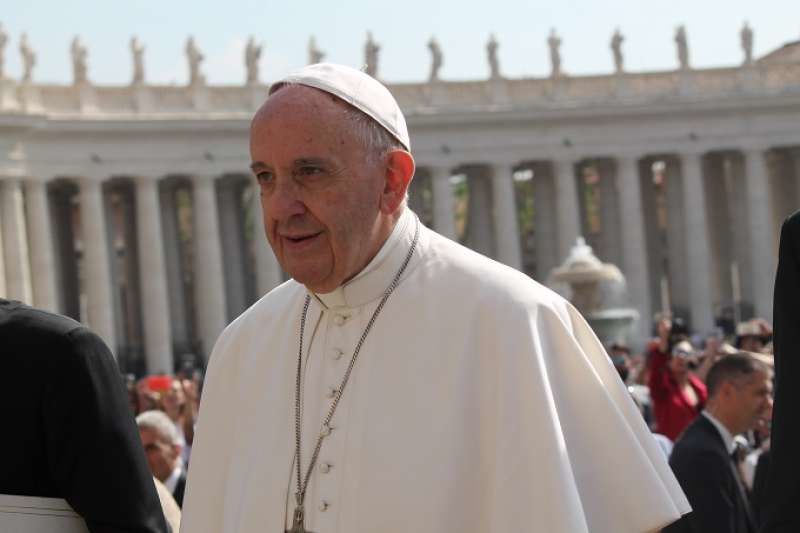In his prayer video for the month of May, Pope Francis said laypeople are on the “front lines” of the Church's life and activities, and asked Catholics of all states and vocations to pray for the laity and their mission.
“Laypeople are on the front line of the life of the Church,” the pope said in the video, published May 3, urging the Church to be thankful for the laity “who take risks, who are not afraid and who offer reasons for hope to the poorest, to the excluded, to the marginalized.”
As Francis speaks in his native Spanish, the video shows lay people in different professional and familial states, including a doctor embracing a patient, a mother holding her child, a newlywed couple leaving a church and rescue workers bringing a boat of migrants ashore.
The video then shows scenes of families, scenes of people jumping up and down and hugging during a sports competition, people hiking and a couple working in a greenhouse.
“Let us pray together this month that the lay faithful may fulfill their specific mission, the mission that they received in Baptism, putting their creativity at the service of the challenges of today's world,” he said, adding that “we need their testimony regarding the truth of the Gospel and their example of expressing their faith by practicing solidarity.”
An initiative of the Jesuit-run global prayer network Apostleship of Prayer, the pope’s prayer videos are filmed in collaboration with the Vatican Television Center and mark the first time the Roman Pontiff’s monthly prayer intentions have been featured on video.
The Apostleship of Prayer, which produces the monthly videos on the pope’s intentions, was founded by Jesuit seminarians in France in 1884 to encourage Christians to serve God and others through prayer, particularly for the needs of the Church.
Since the late 1800s, the organization has received a monthly, universal intention from the pope. In 1929, an additional missionary intention was added by the Holy Father, aimed at the faithful in particular.
However, as of last year, rather than including a missionary intention, Pope Francis opted to have only one prepared prayer intention — the universal intention featured in the prayer video — and will add a second intention for an urgent or immediate need should one arise.
In comments in a May 3 press release on the video, Fr. Frédéric Fornos, SJ, international director of the Pope’s Worldwide Prayer Network and the Eucharistic Youth Movement, noted that often people think priests are the only ones responsible for carrying forward the Church's mission.
However, lay people “are the ones who are at the heart of the world, and the ones who have a key role in transforming society,” he said, adding that “it is in families, in classrooms, in offices, in factories, in the fields, in daily life, where we find the opportunity to be salt and light of God’s Kingdom, the flavor of the Gospel.”
Pope Francis himself has been a frequent critic of clericalism, saying that for many, the Church is reduced to just priests and the hierarchy, and encouraging lay Catholics to be more active in evangelizing. He has also made incorporating more space for laity within the ranks of the Curia a goal of his reform.
In an April 2016 letter to the Pontifical Commission for Latin America, Pope Francis called clericalism “one of the greatest distortions” facing the local Church on the continent.
“[We’d] do well to recall that the Church is not an elite [of] priests, of consecrated people, of bishops but all of us make up the faithful and Holy People of God,” he said, noting that everyone begins their life as a layperson.
Clericalism, he said, is the result of “a mistaken way of living out the ecclesiology proposed by the Second Vatican Council,” which “forgets that the visibility and the sacramentality of the Church belong to all the people of God and not just to an illuminated and elected few.”
He discouraged clergy from relying on trite phrases about their flock such as “it’s time for the laity.”
While well-intentioned, the phrase has little meaning when stacked against actions, he said, explaining that clergy should focus on encouraging the laity to be active, but “it is not the job of the pastor to tell the laypeople what they must do and say.”
“It is illogical and even impossible for us as pastors to believe that we have the monopoly on solutions for the numerous challenges thrown up by contemporary life.”
In an interview given to El Sembrador Nueva Evangelización — ESNE TV and Radio station the same year but published in 2017, Francis said he believes laity need to “come out of the caves.”
“Sometimes I think the best business we can do with many Christians, is to sell them mothballs so that they put them in their clothes and in their lives and aren’t eaten by moths,” he said, explaining that in order to fulfill their mission, lay Catholics “have to go out, they have to go and bring the message of Jesus” to others.
Similarly, in a speech to Bangladeshi bishops during his visit to the nation in December 2017, the pope told them to “show ever greater pastoral closeness to the lay faithful, and to “recognize and value the charisms of lay men and women, and encourage them to put their gifts at the service of the Church and of society as a whole.”

